Weather talk: Is there a way to make it interesting?
- Published
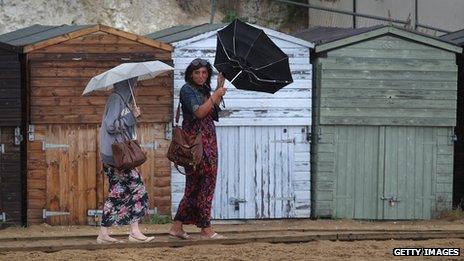
The rain-lashed Jubilee weekend provoked a torrent of weather talk. But how can this most British of conversations be made interesting?
There's only one thing more British than talking about the weather. Apologising for doing it.
Samuel Johnson, the poet and lexicographer, said in 1758: "When two Englishmen meet, their first talk is of the weather." And 250 years later <link> <caption>surveys suggest</caption> <url href="http://www.telegraph.co.uk/news/uknews/3410733/Talking-about-weather-is-top-British-trait.html" platform="highweb"/> </link> it is still regarded as the most British of traits.
The UK is often said to be blessed with "a lot of weather" unlike places with a fixed climate or predictable seasons. In 1858, The Water-Babies author Charles Kingsley wrote: "Tis the hard grey weather breeds hard English men."
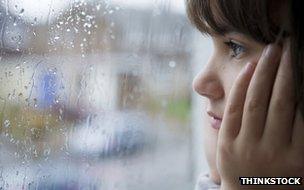
Another rainy holiday weekend
As a gambit, the weather is a reassuring icebreaker for strangers on trains and in myriad, awkward lift journeys.
It can be a crushingly banal conversational filler. "Hot enough for you?" might evoke the response "glorious, isn't it?" Or "Brrrrrrr, bit nippy today," answered by "Brass monkeys!"
But assuming that weather conversation is inevitable, how can people make it a bit more interesting?
Know your clouds
Most people have a very simplistic view of weather, says Gavin Pretor-Pinney, founder of the Cloud Appreciation Society. "I like to fight this tendency to break it down into good weather versus cloudy weather. Clouds are one of nature's most beautiful shows."
But what is a cloud? "It's water suspended in the atmosphere. It's white because it's made up of tiny countless particles, which scatter the light like a frosted glass." Not only are they attractive, they tell you about what the weather is doing. So it's crucial you can identify the different clouds.
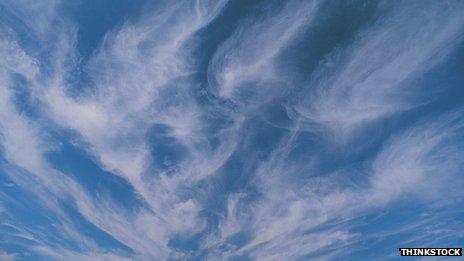
Cirrus clouds: Composed of ice crystals and generally see-through - visit bbc.co.uk/greatbritishweather for more information
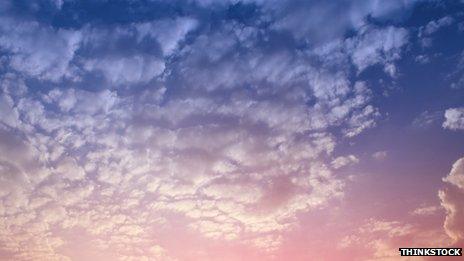
Altocumulus: Layers or patches of individual clumps of cloud, look similar to cotton wool balls
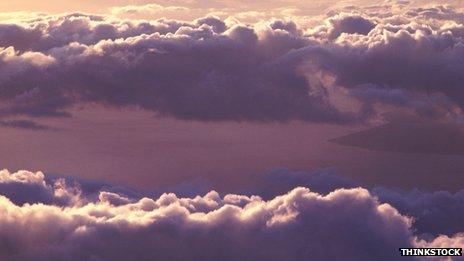
Stratocumulus (pictured here with cumulus): Most widespread of all cloud types in the UK, formed from a low layer or patch of cloud with a clumpy base
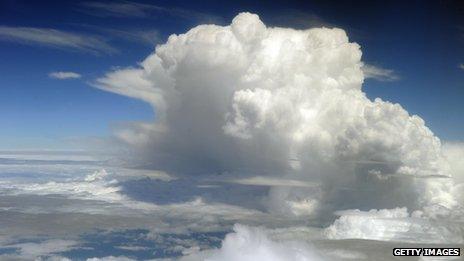
Cumulonimbus: Often described as the King of Clouds, these can reach 10 miles into the sky
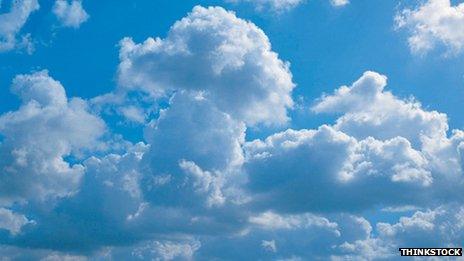
Cumulus clouds: Cotton wool puffs which tend to form a few hours after daybreak and scatter before sundown
Low in the sky there's the classic cotton wool Cumulus, the Stratus, a layer of "rather dull" cloud, and higher up Cirrus - "a translucent delicate streak as if a watercolour brush has been stroked across the blue".
For real kudos people should pick up lesser known classifications. Stratocumulus is a continuous layer of cumulus that looks like a "tray of bread rolls". Altostratus is higher than stratus but beware. Alto, as in music, doesn't mean high but mid-level.
If you see Cirrus joining together, then you can tell the neighbour that there's a change in the weather coming, quite likely rain. Cirrocumulus is high cloud that looks like grains of salt. It's the rarest of the 10 main clouds. Cirrostratus is a "very subtle" cloud that can be nothing more than a milky whitening of the sky.
Perhaps most exciting of all are the rain (nimbo) clouds, suggests Pretor-Pinney. But they are not to be confused with each other. "Nimbostratus are a thick, dark grey layer that produces continuous rain or snow."
Rather more dramatic is "king of clouds" the Cumulonimbus. It's a huge towering dark cloud, shaped at the top like a blacksmith's anvil, and responsible for sudden downpours. "The heavens open then suddenly it ends and the sun comes out."
If all else fails, you can try and find symbols in the clouds, the subject of a new book edited by Pretor-Pinney - Clouds That Look Like Things. "Finding shapes is one of the great pastimes that goes back to the ancient Greeks," he says. "We get a lot of animals in the sky, quite often elephants with trunks."
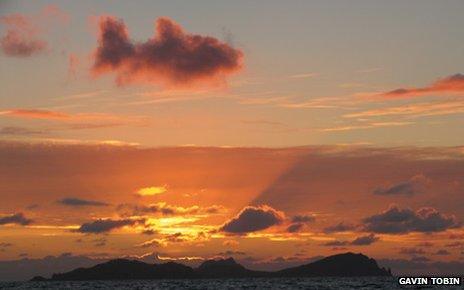
A red snapper, from the book Clouds That Look like Things
Understand why weather happens
"People will talk about the weather despite not knowing anything about how it works," says meteorologist Philip Eden.
One classic conversation is about how the sky looks. So why does it look blue? It's because of "Rayleigh scattering", says Eden. Light travels in a wave and when small particles are in the air it causes the light to be scattered. Because air particles are of a particular size they scatter blue light.
Dust particles in turn scatter red light, causing red sunsets. A grey sky is caused by clouds. True haze is moisture, hazy sunshine not really haze at all but the effect of the clouds.
But what about wind - where does that come from? There is unequal heating of the oceans and continents, the tropics and the poles. As the Earth rotates on its axis, that causes pressure differences around the world, Eden says. The wind blows from high to low pressure areas.
Snow is the most "natural" form of precipitation. Nearly all precipitation starts as snow - rain is when this melts, sleet is half melted snow, and hail occurs when water droplets get sucked up to the to the top of Cumulonimbus clouds where they freeze.
A thunderstorm in folklore was "God moving the furniture". It is actually caused by ice crystals moving in different directions. Eventually it will discharge and that is a lightning strike, Eden says.
Get poetic
Literature has many evocative weather scenes for people to talk about. Marcel Proust used the changing seasons to vividly evoke time and mood in A La Recherche Du Temps Perdu. "Sometimes, on days when the weather was beyond redemption, mere residence in the house, situated in the midst of a steady and continuous rain, had all the gliding ease, the soothing silence, the interest of a sea voyage; another time, on a bright day, to lie still in bed was to let the lights and shadows play around me as round a tree trunk."
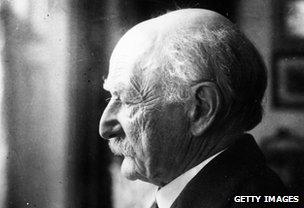
English writer Thomas Hardy turned rain into poetry
It's often said that in Thomas Hardy's novels the weather acts like a character. But his poetry is just as evocative, says his biographer Claire Tomalin. A Thunderstorm In Town is one of her favourites. In just 10 lines a man tells the story of waiting in a hansom cab with the object of his desire while the rain pours down.
It concludes poignantly: "Then the downpour ceased, to my sharp sad pain, And the glass that had screened our forms before Flew up, and out she sprang to her door: I should have kissed her if the rain Had lasted a minute more."
An unexpected quotation may be amusing or pretentious depending on the context. But for Tomalin we can learn from the "acute observation" that writers like Hardy bring to the weather. "He draws these marvellous vignettes. When you're sitting in a cab and it's raining it'll come back to you," she says.
Follow the money
A rainy day can put people off going to the shops. It may also mean less spending on ice cream and more at cinemas. Snow - as George Osborne famously argued - may dent economic growth.
None of this is an exact science, says Prof John Sloman, director of the Economics Network. But April's "really bad" weather does seem to have hit retailers' footfall. Farmers want rain in the spring and a nice dry harvest.
But it's complicated. Good weather for all farmers may not be good news for farmers individually. "Olive oil prices are plummeting at the moment. The reason is there's a bumper harvest."
Tourism is one area where the equation is more straightforward. "Daytripper tourism is clearly affected by the weather. It's different if you've booked ahead to stay for a weekend as you're already committed." When the sun shines, we tend to spend more spontaneously, book that camping holiday and buy those hiking boots, he argues.
For international tourism, perception is all-important. So certain moments like Wimbledon or the Olympics become crucial. "If it rained every day of the Olympics I'm sure bookings to the UK for summer 2013 would fall."
Master the difference between climate and weather
People confuse weather and climate, says Eden. The UK has a temperate climate with variable weather but an absence of extremes. "Weather is what happens day to day. Climate is over a year or over a period of years."
And people in the UK misunderstand what the normal climate is, he argues. They expect hot summers and cold, snowy winters and mostly they're not like that.
"The climate is very equable. The normal British summer is unsettled, changeable and cloudy. We have hot spells but it breaks down quickly."
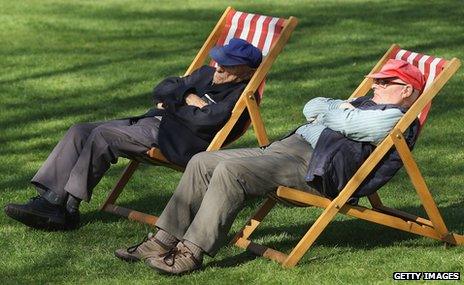
Explain its influence on key events
The weather's influence is often crucial. The Battle of Agincourt might not have been won by the English were it not for heavy rain before the hostilities began. It caused the heavily armoured French knights to sink into the mud, handing the initiative to the outnumbered English archers.
There are many similar moments throughout history, as Laura Lee outlined in her book Blame it on the Rain. Hitler's invasion of Russia might have succeeded if there'd been a late autumn. It's likely JFK would not have won the presidency if polling day had been sunny. And a "little ice age" during medieval times led women to be accused of witchcraft for changing the weather.
It's not only in history that weather is decisive. The same is true in fiction, says John Mullan, author of What Matters in Jane Austen?
Weather allows Austen to set out the notion of chance and to bring certain characters together. Without bad weather being followed by sun at the end of Emma, Mr Knightley would not have proposed to the eponymous heroine. "The shrewd reader will regard the final betrothal of Emma and Mr Knightley as inevitable," Mullan writes. "But the best comedy recruits chance, and the lucky change of weather in Emma is there to let us imagine how it might have been otherwise."
If all else fails, laugh
"What did one tornado say to the other? Let's twist again like we did last summer" might not be everyone's cup of tea. But there's humour to be had from unexpected downpours and unseasonal heatwaves.
"I said," wrote the Irish poet Oliver St John Gogarty, "'It is the most extraordinary weather for this time of year!'" The reply comes back, "'Ah, it isn't this time of year at all.'"
Weather forecasts are full of weird jargon. A few years ago Today presenter John Humphrys picked up on the Met Office's adoption of the phrase "organised bands of rain". What did it mean?
Philip Eden says such language is ripe for satire. "To most people the rain starts and then it stops. It's not organised even if that's how it looks on a weather chart."
Punning is another rich seam. Eden remembers working at the radio station LBC when Sir Michael Parkinson was a presenter. "I was chatting on air with him and I couldn't resist saying 'it's a bit parky this morning'. He was not amused."
- Published13 July 2011